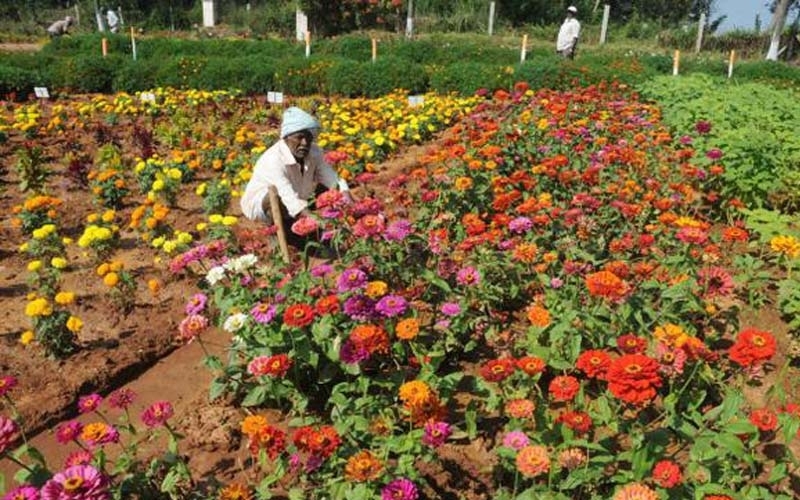Third Indian Horticulture Summit-cum-Int’l Conference to be held at Jaipur from 1st Feb

By SHRI RAM SHAW
New Delhi: The 3rd Indian Horticulture Summit-cum-International Conference-2024 with a theme, ‘Technological Intervention for Boosting Horticultural Production’ will be organized at the Rajasthan Agricultural Research Institute (S K N Agriculture University, Jobner), Durgapura Campus, Jaipur, Rajasthan from February 1-3, 2024, in collaboration with Division of Vegetable Science, ICAR-IARI, New Delhi; Gautam Kalloo Research and Development Foundation, Varanasi; Dr Y.S.R. Horticultural University, West Godawari District, Andhra Pradesh; and ICAR-Directorate of Medicinal and Aromatic Plants, Anand, Gujarat.
The SHRD has organized 1st Indian Horticulture Summit-2020 at Chitrakoot from 14-16 February 2020 and the 2nd Indian Horticulture Summit-2022 during 27-29 April 2022 at Navsari Agricultural University, Navsari, Gujarat. Those events were very successful scientific event.
Read More: Bonsai Technique: An exclusive sector in the landscape gardening industry
Dr. Som Dutt, secretary, SHRD told Nursery Today, “The horticultural science, deals with a number of important commodities having vast potential for nutrition and health for human beings, socio-economic upliftment, women empowerment, and for earning foreign exchange through export, has emerged as a very promising discipline in total agricultural development in India.”
“By surpassing the total foodgrain production long back, horticultural science alone contributes more than 30 per cent of the total agricultural GDP in our country. Though a number of breakthroughs have resulted in enhancing the productivity and production per unit area in many horticultural crops, there is still a need to develop new varieties/ hybrids, technologies, and exploration of underutilized crops, and also to explore the untapped potential of many horticultural crops,” he added.
Keeping in view, the Society for Horticultural Research and Development (SHRD), Ghaziabad, Uttar Pradesh, India, in collaboration with S K N Agriculture University, Jobner, Rajasthan, India, has decided to convene the 3rd Indian Horticulture Summit-cum-International Conference-2024 to explore new dimensions in research and developmental activities through the sound network of the National Agricultural Research System across the country and global platforms engaged in horticultural research and development.
Read More: We want to become the largest China exporter in India: Rita Chen
Dr. B.S. Tomar, Head, Division of Vegetable Science, ICAR-IARI said, “The Summit will provide a valuable platform to all stakeholders, including eminent scientists, teachers, researchers, students, farmers, entrepreneurs, policy- makers etc. to interact and share their noble experience during Summit. This platform will provide an excellent opportunity to update with the latest research and developmental activities to all stakeholders. The stakeholders will be enriched with advanced technological know-how in their respective fields.”
The Summit-2024 will encompass following objectives:
- Exploring and utilizing the diversity of horticultural crops having enormous therapeutic and nutraceutical values.
- Diversification in horticulture in non-traditional areas.
- Technologies for enhancing farmers’ income through horticulture.
- Strategies for crop improvement through advanced tools and techniques.
- Technological interventions in crop health management.
- Climate-resilient horticultural technologies for sustainable production.
- Exploitation of horticultural crops for health and nutritional security.
- Wasteland development through potential horticultural crops.
- Mitigating climate change through horticulture.
- Eco-friendly biotic stress management in horticultural crops.
- Organic and natural horticultural production.
The Summit will focus on following themes:
- Germplasm resources, genetic diversity, exploration, evaluation, conservation, and utilization: Germplasm resources for special traits, development of genetic stocks for biotic and abiotic stresses and quality traits (nutrition and processing), prebreeding, rootstock breeding, and harnessing potential crops to diversify agricultural system and enhance food security.
- Crop improvement through conventional and genomic approaches: Genetic improvement through conventional breeding, genetic mapping and genome editing, molecular markers for crop improvement, OMICS and bio-informatics technologies for more precise and efficient development of improved crop varieties with desired traits.
Read More: Bonsai Technique: An exclusive sector in the landscape gardening industry
Advances in production technology of horticultural crops:
- Innovations and adoption of breakthroughs in horticultural crop production, challenges and opportunities in organic production of horticultural crops for overall development and success of the horticulture industry.
- Post-harvest management, processing, value-addition and export of horticultural crops: Post-harvest management of perishable commodities through emerging technologies like nano-encapsulation, smart packaging, value-added products, minimal processing, thermal and non-thermal processing, functional foods and waste utilization, export possibilities of horticultural commodities through Agri Export Zones (AEZs) to enhance profitability, reduce waste, and contribute to economic development.
- Clean planting material and quality seed production using modern techniques: Production of clean planting material and high-quality seeds of horticultural crops including advanced techniques such as tissue culture, micropropagation, hybrid seed production, genetic testing, and seed treatment methods to meet the growing demand nationwide contributing to improved yield, quality, and overall productivity.
- Precision farming and protected cultivation: Site-specific crop management, integrated resource management through precision horticulture, drone technology, GIS, GPS, nutrient film technique, drip fertigation, soil-less cultivation such as hydroponics and aeroponics, challenges and opportunities in protected cultivation, grafting technology for biotic and abiotic stress management to optimize resource use, improve crop performance, and capitalize on market opportunities for sustainable and efficient production, mitigating environmental impacts and ensuring food security.
- Advances in plant health management: Integrated management of pest and diseases through modern approaches including diagnostics for in-field disease diagnosis, new molecules and botanicals, biocontrol for enhancing productivity and quality, and management of pesticide residues for production of high-quality and safe horticultural crops.
- Climate smart horticulture: Canopy management, high-density planting, utilization of rootstocks for managing biotic and abiotic stresses, recent developments in biofertilizers, nano-urea, fertigation and open-field hydroponics, organic horticulture, conservation horticulture, zero-budget farming, deficit irrigation, agronomic biofortification through multi-micronutrient foliar fertilization in horticultural crops.


